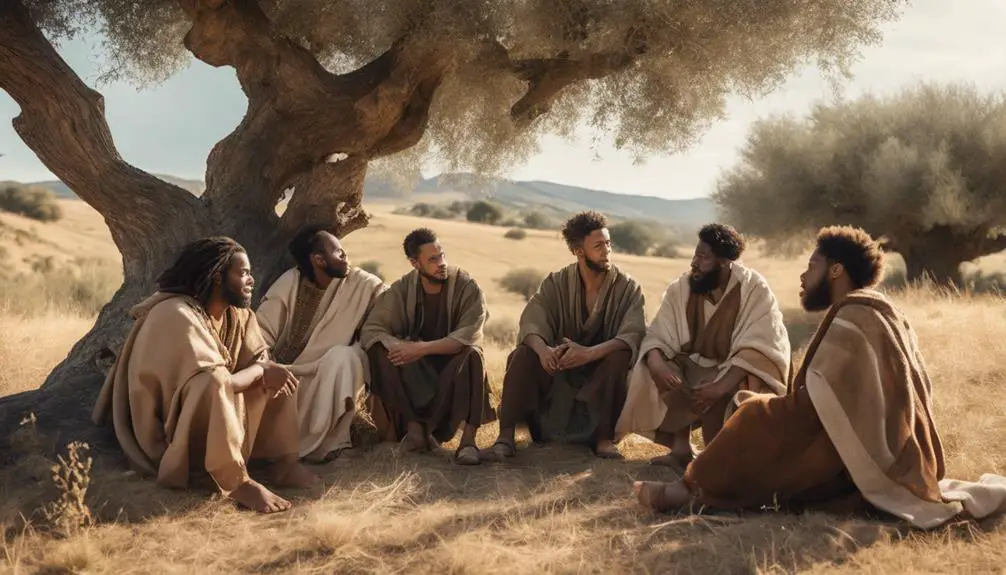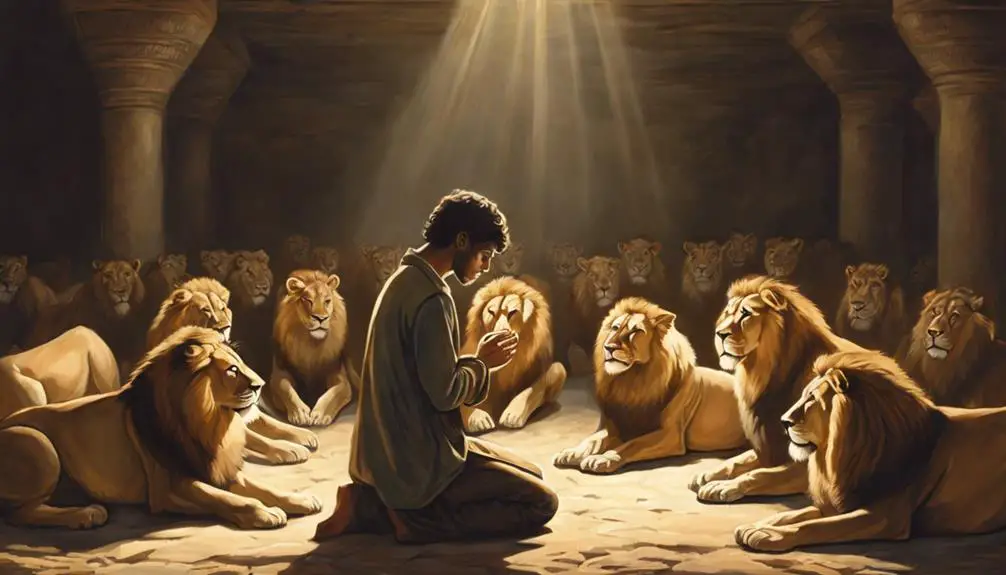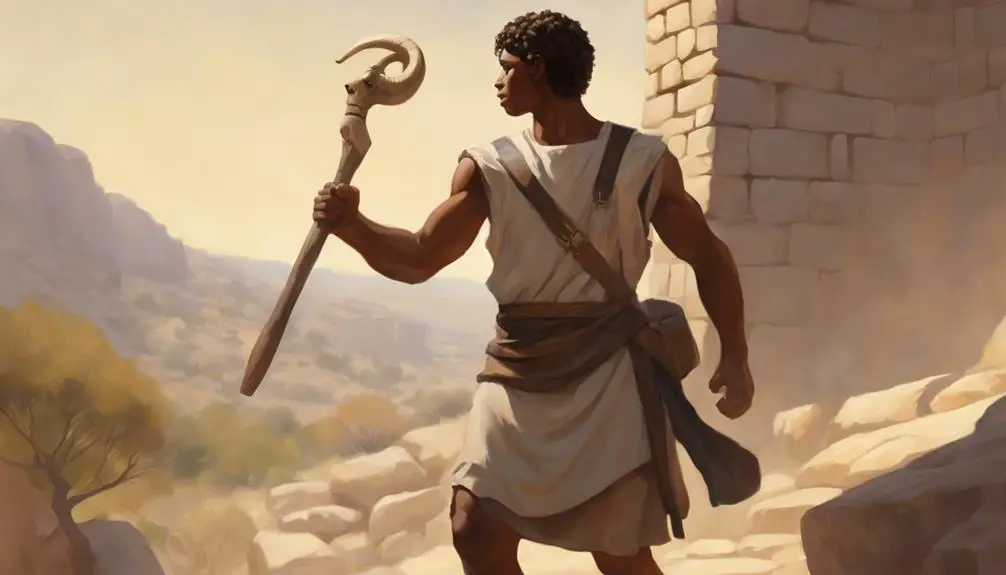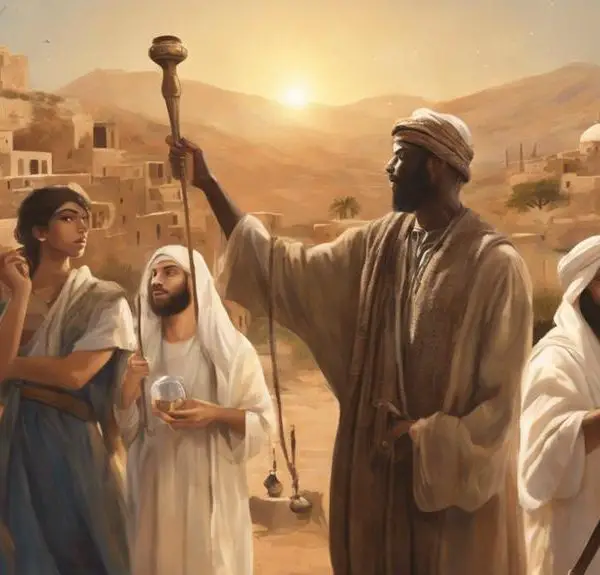Courageous young men in the Bible inspire with tales of faith and bravery, beckoning you to discover their timeless lessons.

Young Men in the Bible
In the tapestry of biblical narratives, young men shine like stars in the night sky, each with a unique story that illuminates the power of faith and courage. You've likely heard of David, who, armed with nothing but a sling and a stone, defeated the towering Goliath, symbolizing the triumph of the underdog.
But beyond David's legendary battle, the lives of Joseph, Daniel, Timothy, and Joshua offer you a rich exploration into resilience, integrity, and leadership. As you ponder their journeys, you'll find yourself at the crossroads of ancient wisdom and modern challenges, inviting you to uncover how their timeless lessons can guide you today.
Key Takeaways
- Young men in the Bible demonstrate resilience and courage in the face of adversity.
- Their stories highlight the importance of faith and divine guidance in achieving victory.
- Mentorship plays a crucial role in their growth and spiritual development.
- Their experiences offer lessons on leadership, endurance, and the significance of personal conviction.
David: Defeating Goliath

David's confrontation with Goliath stands as a pivotal moment of faith and courage in biblical narratives, showcasing a victory that defies conventional martial expectations. This account, deeply embedded within Judeo-Christian traditions, exemplifies courageous faith not merely as an abstract virtue but as a tangible catalyst for unexpected victory. You'll observe how David, devoid of the physical stature and armor typical of a warrior, confronts Goliath armed with nothing but a sling and his unwavering belief in divine support.
Analyzing this narrative, it's crucial to recognize the deliberate contrast between David's humble approach and Goliath's formidable presence. This dichotomy isn't just a literary device; it serves to underscore the power of faith over might, a recurring theme in sacred texts. David's victory isn't attributed to physical prowess but to his steadfast faith and the strategic use of his skills, thereby offering a profound lesson: courageous faith can lead to outcomes that defy logical expectations.
This story, thus, doesn't merely recount an underdog's triumph but delves deeper into the essence of faith's role in overcoming seemingly insurmountable obstacles, presenting a nuanced exploration of the dynamics between belief, courage, and victory.
Joseph: From Slavery to Power
Just as David's story highlights the triumph of faith over physical might, Joseph's journey from slavery to power in Egypt exemplifies resilience and divine providence in navigating life's adversities. Sold into slavery by his own brothers, jealous of his coat of many colors, a symbol of their father's favoritism, Joseph's life seemed to take a tragic turn. Yet, this was merely the beginning of a story marked by perseverance and an unwavering belief in God's plan.
- Dream Interpretation: Joseph's ability to interpret dreams wasn't only a testament to his divine gift but also a crucial skill that elevated him from a prisoner to Pharaoh's trusted advisor. This unique talent showcased how Joseph leveraged his spiritual insight to navigate and influence the political landscape of Egypt.
- Coat of Many Colors: More than a piece of clothing, it symbolized Joseph's special status in his family and foreshadowed his future distinction in Egypt. Despite being stripped of this coat, Joseph never lost his identity or his faith.
- Resilience in Adversity: Joseph's journey teaches the importance of steadfastness. Despite being betrayed and wronged, he remained committed to his faith and morals.
- Divine Providence: Joseph's story is a profound narrative on how divine will operates within the framework of human actions and decisions, guiding him to a position of power where he could save nations from famine.
Joseph's ascent from slavery to becoming a central figure in Egypt's survival strategy underscores a narrative rich in faith, resilience, and the intricate dance between destiny and human endeavor.
Daniel: Faith in the Lions' Den

In the heart of ancient Babylon, Daniel's unwavering faith placed him directly in the jaws of peril, facing a den of lions as a testament to his steadfast belief in God's protection. This narrative isn't just a dramatic tale of survival; it's a profound exploration of faith's resilience and the symbolism of lions throughout biblical lore.
Aspect |
Detail |
Significance |
|---|---|---|
Lions' Symbolism |
Power & Danger |
Represent challenges to faith |
Daniel's Faith |
Unyielding |
Emblem of spiritual steadfastness |
Outcome |
Divine Rescue |
Illustration of faith's reward |
Legacy |
Inspirational |
Encourages enduring faith |
Daniel's story is a compelling discourse on the power of faith under trial. The lions, emblematic of formidable challenges, test Daniel's faith, yet his resilience shines, illustrating a crucial lesson: faith, when genuinely held, is impermeable to the most daunting of threats. This narrative underscores the notion that faith's strength isn't merely in averting dangers but in the tranquility it offers amidst storms. Daniel, by embodying this principle, emerges not just as a survivor but as an enduring symbol of faith's potency against life's lions.
Timothy: A Young Minister
Shifting focus from the unwavering faith of Daniel in the face of danger, we now turn our attention to Timothy, a young minister whose journey encapsulates the challenges and responsibilities of spiritual leadership in the early Christian community. Under Paul's mentorship, Timothy exemplifies the transformative power of disciplined spiritual growth and the profound impact of guidance from a seasoned leader. His story isn't just about his youthful energy but also about the depth of his faith and the maturity of his service.
- Paul's Mentorship: A pivotal element in Timothy's development, showcasing the significance of experienced guidance in nurturing young leaders.
- Spiritual Growth: Timothy's journey is marked by continuous growth, reflecting the importance of personal faith development in effective ministry.
- Leadership Challenges: Despite his youth, Timothy faced and overcame various obstacles, illustrating the universal challenges of spiritual leadership.
- Community Impact: Timothy's ministry had a profound effect on the early Christian communities, highlighting the potential of young ministers to influence and shape the faith of others.
Timothy's story offers a nuanced exploration of the dynamics between mentorship and personal development, reinforcing the value of spiritual growth and leadership in the Christian context.
Joshua: Stepping Into Leadership

Often, stepping into leadership involves navigating the vast shadow of a predecessor, a challenge that Joshua faced with remarkable faith and determination as he assumed Moses' mantle to lead the Israelites. This courageous transition underscores the inherent complexities of leadership succession, particularly when the predecessor, Moses in this case, is a figure of monumental historical and spiritual significance. Joshua's journey from Moses' aide to the leader of a nation exemplifies not only the importance of mentorship but also the necessity of developing one's vision and approach.
The mentorship Joshua received under Moses' tutelage was instrumental in preparing him for the responsibilities that lay ahead. It equipped him with invaluable lessons in leadership, faith, and governance, illustrating the profound impact of mentorship on leadership development. Yet, Joshua's story is also a testament to the need for personal courage and initiative. He didn't merely replicate Moses' leadership style; instead, he forged his path, guided by his faith in God and his unique vision for the Israelites.
Joshua's transition into leadership, therefore, offers critical insights into the dynamics of mentorship, the challenges of succeeding a legendary leader, and the importance of courage and personal conviction in navigating such transitions.
Frequently Asked Questions
How Did the Cultural and Societal Norms of Their Times Influence the Actions and Decisions of These Young Men in the Bible?
Your actions and decisions are often shaped by the era you're living in, reflecting a dance between cultural conformity and societal rebellion. This dynamic pushes you to either align with the prevailing norms or challenge them, forging your path.
In analyzing historical figures, it's crucial to understand how their cultural backdrop influenced their choices, revealing a complex interplay between their personal convictions and the societal expectations they navigated. This approach offers deep insights into their character and motivations.
What Psychological Challenges Might These Young Men Have Faced Due to Their Extraordinary Circumstances, and How Did They Cope With Them?
Facing extraordinary circumstances, you'd likely encounter psychological challenges similar to those of historical figures. Emotional resilience becomes key in navigating stress and adversity.
Faith-driven decisions might serve as a coping mechanism, offering a sense of purpose and guidance when confronted with difficult choices. Analyzing these situations, it's evident that reliance on internal strength and beliefs can significantly influence how one manages and overcomes psychological hurdles, reflecting a profound interconnection between mindset and outcomes.
Are There Any Archaeological Evidences or Historical Records Outside the Bible That Corroborate the Stories of These Young Men?
When exploring historical accuracy, you'll be fascinated to learn that only about 10% of ancient artifacts can be directly linked to specific historical figures or events. This scarcity challenges scholars in verifying the authenticity of artifacts and conducting inscription analysis.
Your interest in whether external evidence corroborates specific stories involves delving into archaeology and historical records, requiring a detailed, analytical approach to assess artifact authenticity and decipher inscriptions critically.
How Have the Stories of These Young Men Been Interpreted Differently Across Various Christian Denominations and Other Religions?
You'll find that the interpretation of these narratives varies significantly across Christian denominations and other religions, reflecting a rich tapestry of denominational perspectives.
Interfaith dialogues have further illuminated these differences, showcasing how each tradition brings its unique lens to these stories.
This diversity in understanding underscores the complexity of religious texts and highlights the importance of context in shaping religious thought and belief systems.
What Role Did Mentorship Play in the Lives of These Biblical Figures, and How Can the Concept of Mentorship From Their Stories Be Applied in Today's Society?
Imagine, if you will, the impact of mentorship sculpting tomorrow's leaders.
Modern mentorship, drawing lessons from historical narratives, shapes leadership models that resonate deeply in contemporary society.
Analyzing these age-old mentorship dynamics reveals insights into nurturing leadership and guidance.
By applying these concepts, you're not just following a path but weaving the fabric of future leadership.
It's about embracing the wisdom of the past to mentor effectively in today's fast-paced world.
Conclusion
In analyzing the narratives of these young men, it's evident that their stories aren't mere tales of heroism, but intricate lessons on resilience, faith, and leadership.
Each character, from David's audacity against Goliath to Timothy's youthful ministry, embodies a unique virtue that transcends time.
As we delve deeper, we uncover a tapestry of divine orchestration and human courage.
The suspenseful question remains: how will their ancient wisdom inspire the next generation to navigate life's colossal battles?



Sign up